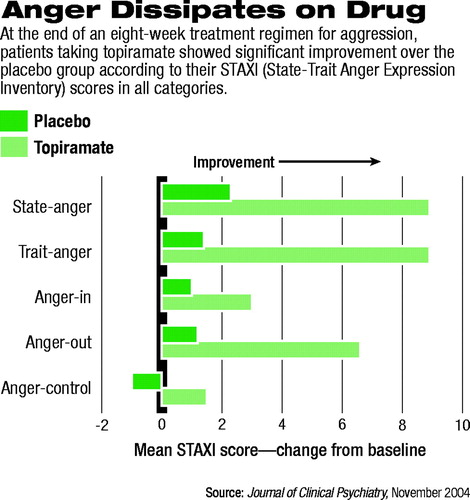Women With Borderline Disorder Show Less Anger on Anticonvulsants
Women with borderline personality disorder who took the anticonvulsant topiramate displayed less anger compared with those on placebo, said German researchers. They also lost weight, an important consideration for a class of drugs that often provokes weight gain.
The research extends evidence of the use of anticonvulsant medications like valproate and carbamazepine in the treatment of pathologic aggression, said lead author Marius K. Nickel, M.D., of the Clinic for Psychosomatic Medicine in Simbach/Inn, Germany. Earlier trials had tested topiramate's effects on aggression, but this is the first such placebo-controlled study, he said.
“Anger and aggression are big problems in borderline personality disorder, so even a small trial like this is welcome,” said Frances Frankenburg, M.D., a psychiatrist at the Veterans Affairs Medical Center in Bedford, Mass., and an associate professor of psychiatry at the Boston University School of Medicine. “It's always nice to have studies from Europe to gain a different perspective.”
Through general practitioners, the German researchers recruited volunteers who expressed feelings of constantly increasing anger in screening interviews. They were randomized in a 2:1 ratio to topiramate (n=19) or matching placebo (n=10). Eight weeks of topiramate treatment began at 50 mg a day and was titrated up to 250 mg a day at the end of six weeks. Subjects were seen weekly in the clinic and tested using the German-language version of the State-Trait Anger Expression Inventory (STAXI), a 57-item inventory that measures the intensity of anger as an emotional state and the disposition to experience angry feelings as a personality trait, according to its distributor.
Topiramate resulted in statistically significant improvements on four out of five subscales of the STAXI, reported Nickel in the November 2004 Journal of Clinical Psychiatry. The women taking topiramate improved their scores on the STAXI stateanger subscale score (measuring their subjective state of anger) by 21 percent. Trait-anger, the readiness to react with anger, improved by 24 percent, while the tendency to direct anger outward, anger-out, improved by 23 percent compared with placebo. Anger-control, the socially desirable ability to keep anger under control, strengthened by 13 percent.
There was a positive, but not significant, 8.5 percent change favoring topiramate on the scores for anger-in, the tendency to repress anger.
Since the women were tested with the STAXI protocol every week, it was possible to see that the beneficial effect of the drug began modestly but produced a rapid improvement after approximately the fifth week, said Nickel.
“No psychotic symptoms or other serious side effects were observed, nor did subjects in either treatment group engage in self-mutilation or suicidal acts during the study,” he said. Isolated cases of fatigue, dizziness, headache, and paresthesia were reported as side effects.
However, the relative brevity of the trial may have also contributed to its apparent safety, cautioned Frankenburg.
“Topiramate may be hard to tolerate over the long haul because it induces cognitive decline,” she said. She also expressed concern about the drug's safety in pregnancy, since anticonvulsants may cause birth defects. Women in this trial averaged 25 years old but were excluded if pregnant or contemplating having a baby.
Other anticonvulsant mood stabilizers, like valproate or carbamazepine, can cause patients to gain weight. The patients in this trial lost an average of 2.3 kg during the course of the study, somewhat less than in previous tests of topiramate, said Nickel. “Reduced appetites and weight loss were observed and usually seen as beneficial.”
Losing weight may seem like good news for patients and an incentive for compliance, but other drugs that cause weight loss early in clinical trials have evidenced problems later, said Frankenburg. “I'm a bit of a puritan,” she said. “The secret of weight loss is to eat less.”
The researchers say their work now needs to be replicated among larger numbers of patients, among men, among more severely ill patients, and for longer periods of time. The brief, eight-week duration of this trial reduced the dropout rate, a problem that often undermines the validity of longer trials, they said.

The authors reported no financial affiliation or other relevant conflicts of interest.
An abstract of “Topiramate Treatment of Aggression in Female Borderline Personality Disorder Patients: A Double-Blind, Placebo-Controlled Study” is posted online at<www.psychiatrist.com/abstracts/200411/110410.htm>.▪



